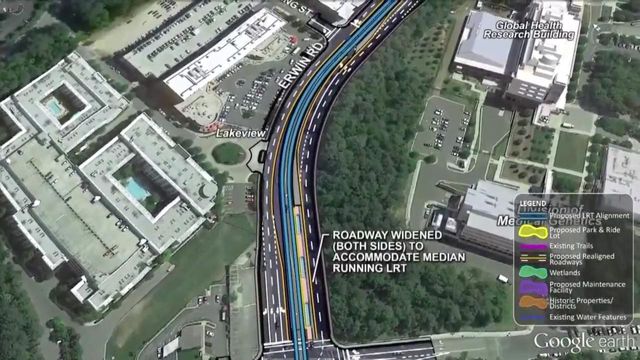GoTriangle offers Duke another four to six weeks to sign light-rail agreement
A Durham councilman suggested using eminent domain to take land from Duke University for the Durham-Orange Light Rail Project. A day later, GoTriangle offered Duke another four to six weeks to negotiate.
Posted — UpdatedA day after a Durham City Councilman suggested using eminent domain to take land needed for the Durham-Orange Light Rail project away from Duke University, the GoTriangle president and the chairwoman of its board of trustees offered an olive branch Tuesday -- the possibility of a four- to six-week extension of the Feb. 28 deadline for Duke to make a commitment to the project.
In a letter to Duke President Vincent Price, GoTriangle President Jeff Mann and Ellen Reckhow, chairwoman of GoT board of trustees, chastise the university for not mentioning its concerns about vibrations and electromagnetic waves years ago, when an environmental impact statement was being prepared.
"The lack of a cooperative agreement with Duke creates significant challenges for the Light-Rail Project," Mann and Reckhow wrote, "effectively nullifying two decades of work."
But their letter quickly turns conciliatory. It points out that electromagnetic interference, or EMI, has not been shown to create problems elsewhere in the country, but pledges to pay for monitoring and, if any EMI is detected, to pay for a magnetic-field canceling system, which it says is readily available.
Mann and Reckhow express their confidence that the rail line can be built and operated without causing any vibration that exceeds Duke's standards for other construction near the hospital.
"We believe the most significant source of vibration coming from Erwin Road is and will likely always be traffic on the road itself," they wrote.
GoTriangle has already agreed to build an elevated structure along Erwin Road, where the trains will pass the hospital and research centers.
"The segmented box bridge structure was chosen in coordination with Duke officials because of its aesthetic appeal and the extent to which it will minimize impacts to strategic utilities and emergency access on Erwin Road," the letter says. "This type of structure also mitigates any vibration that may exist as a result of light-rail operations."
Before last week, GoTriangle had hoped that Duke University would donate land that would let a light-rail line bisect its campus.
That hope fell apart when Duke refused to sign a commitment to the Durham-Orange Light Rail project, a 17.7-mile rail line running from the University of North Carolina Hospitals in Chapel Hill to North Carolina Central University in Durham.
Now Durham officials are considering taking the land by use of eminent domain -- taking land without the owner's permission because it is needed for a public use.
"I don’t know if it’s a good idea, but I think it’s an inevitable idea. It’s a discussion that we have to have as a government," said Durham City Councilman Mark-Anthony Middleton.
"It’s not that we want to use eminent domain and we’re not looking to be at war or pick a fight with Duke. But there’s a government integrity issue at stake."
Jason Campbell, an attorney with the North Carolina Eminent Domain Law Firm, says the city and county certainly have that authority under the law, but might want to consider the financial and political repercussions. If Duke does lose the land by eminent domain, a jury could decide how much money the school should be paid.
GoTriangle says the land is worth $16.5 million, not a substantial addition to a project estimated to cost $3.3 billion, but a jury could come up with a different figure.
"Duke is no different than you or I," Campbell said. "If Durham wanted to take our houses, it could. If it wanted to take Duke’s land, it could. The only issue is just compensation."
Middleton says more than money is at stake.
"It’s not that we want to use eminent domain and we’re not looking to be at war or pick a fight with Duke," Middleton said. "But there’s a government integrity issue.... The private regular citizens whose land got taken were probably angry as well.... It’s not a pleasant experience. But, respectfully – as a city, we are not applying for admission to grad school. We’re trying to make public policy. We’re trying to secure our economic future. As a government we can’t decide which tools we’ll use based upon the power and wealth of the one we’re using it against. That’s discriminatory.
"I think we have to demonstrate that we are as serious and as committed to our principles and organizational mission statement as Duke is to theirs."
Campbell agrees that "there’s nothing that inherently would stop a determined government from doing this project."
But he cautions:
"Duke is the flagship university for the state. It is the highest ranked university in the state. It is a giant private employer. The state legislature is vested in making sure that Duke is happy."
And while localities now have wide latitude on when to use eminent domain, Campbell says, "Duke could go back to the legislature and ask them to curtail the power."
The first question, Campbell says, is "how much political power does Duke have. And the answer is a lot. I would imagine it’s going to be a hurdle for Durham and Orange County to have the political wherewithal to take Duke’s land."
Michael J. Schoenfeld, Duke's vice president for public affairs and media relations, said using eminent domain is "a decision that the city and county officials will have to make, and we assume that they will carefully consider the legal and political costs of making such a move."
Related Topics
• Credits
Copyright 2024 by Capitol Broadcasting Company. All rights reserved. This material may not be published, broadcast, rewritten or redistributed.






